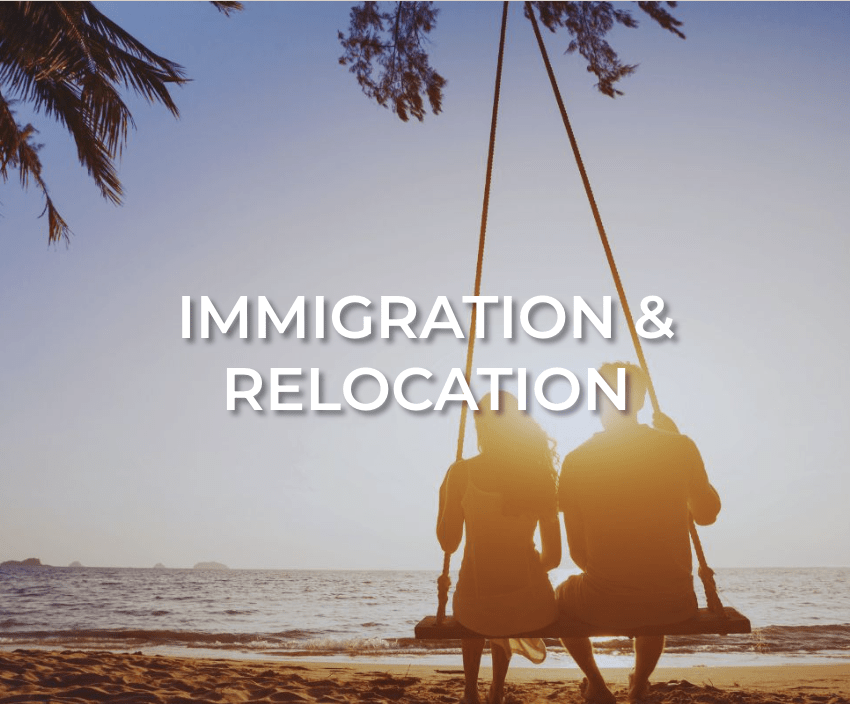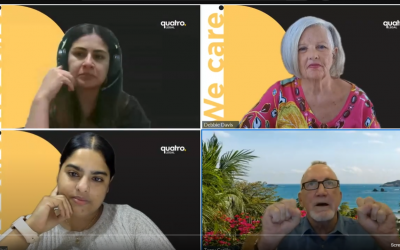

Relocating to Costa Rica: Legal Must-Knows for Expats – Interview with Howler Magazine
by Quatro Legal Immigration Team | Sep. 6, 2024 | Video, Immigration
In this new series from Quatro Legal in collaboration with Howler Magazine, we dive into the essential legal requirements and frequently asked questions about relocating to Costa Rica. Whether you’re in the early stages of planning your move or ready to settle in, this episode offers valuable insights on navigating the process smoothly.
Discover the importance of due diligence, explore Costa Rica’s diverse regions, and learn how legal advice can guide you in renting, buying, or building a home. Join us for actionable tips and expert support to help you make a confident and informed decision about your relocation to this stunning country.
Transcript:
Terry:
Welcome to what’s going to be a new series in collaboration between Quatro Legal and Howler Magazine. I’m Terry with Howler Magazine, and so many people have so many questions about moving to Costa Rica. One aspect of that is understanding the legal requirements. Fortunately, Quatro Legal is here to be your friend through the process. Not only do they care, but they’re here to give you the answers you need to make the best decision about your move, whether you’re coming here for retirement, a second home, or an investment property.
I’ve been with the magazine for five years, and it’s the number one digital platform for information on all things Costa Rica. Today, I’m joined by Debbie from Quatro Legal.
Debbie:
Hi, Terry, how are you, so good to be here, thank you so much.
Terry:
It’s a beautiful day today. I wish this was the view outside my office, but it’s almost the view from my office! I’m located here in Flamingo, and it’s a pleasure to join you for this discussion. So many people have questions, and often they turn to Facebook, where they’ll be ridiculed and they get all sorts of answers, not always accurate. People just want to know the truth—”Tell me what I need to know if I’m going to move to Costa Rica. What are the requirements?”
Fortunately, your agency is here to help people with questions. I think it’s a free initial consultation with you. Can you tell us about what Quatro Legal can do to help someone considering moving or relocating whatever the circumstances are to Costa Rica?
Debbie:
Thank you! I think you hit a nail on the head there with talking about people trying to get their legal advice on Facebook. I don’t see so many people trying to get their medical diagnosis from Facebook. But they really want to get their legal questions on Facebook. While some of that is okay, the problem is that everyone is on a different journey and everyone is coming from a different place as far as what they need, what they are doing, what country they are coming from.
Some people might have moved yesterday and some people twenty years ago. And as we know, things in Costa Rica constantly change. Some little requirement is being tweaked. We’ve been coming to Costa Rica about 15 years, we’re in Samara and have had property there for 14 years and I can tell you, we’ve been through a few attorneys.
The thing I didn’t understand is how important it is to have an attorney in Costa Rica. In my home country, we don’t need an attorney for everything. We don’t need an attorney to buy a car or buy a house. There’s a title company, but we don’t hire an attorney for that. People don’t really understand how important it is to find an attorney that you can talk to that has people who can speak fluent English who you can understand. First and foremost find an attorney. That’s what Quatro is here to do.
At Quatro Legal, we help people understand the requirements, whether it’s about residency, property purchases, or just ensuring all the paperwork is in order. Pretty much any need an expat has in Costa Rica, Quatro can serve that need and help them, and that’s why we’re here and what we’re here to do. So you can get really good answers for you and your family so you can make really informed decisions on what you need to do.
Terry:
Thank you Debbie, that’s really helpful. I know many people ask about moving here and what attracts so many people to Costa Rica. I know every region is different, but what do you think are some qualities that make Costa Rica so appealing?
Debbie:
Costa Rica is a beautiful country. Everybody is looking for a different thing, some people are coming for the weather and leaving the cold North behind. I know I don’t like snow, so that was one of my driving reasons. Some people don’t like the political climate in their home country. Costa Rica is a really great country for a lot of things and a lot of people really appreciate that there is no military and there is a stable government. They also like healthcare, Costa Rica has great healthcare. So I think it checks a lot of boxes that people are looking for whether you’re coming as a pensionada or if they are coming much younger. In the last four, five, six years we’ve had way more families, not just retirees.
Terry:
Yeah it’s become a good hub for remote workers and I think there’s some benefits that the country does to attract remote workers. How did you decide what area that you settled in? What were some key things that helped you decide? Everyone is different and in Costa Rica you can choose a variety.
Debbie:
You can have all kinds of things. You know, we really ran around places, and we ran around in some places that were so remote I told my husband we’re going to have to leave breadcrumbs; I’ll never be able to come and go. I’d be better about it now because we go quad riding, so I have a better sense of direction. But for me, it boiled down to three things: Are you a city mouse, are you a country mouse, or are you a beach mouse? And if you can decide which that is, that’s really what happened to us. I knew what would make me smile and make me happy was a beautiful ocean view, so when I realized that and stopped traipsing around the jungle, it made everything very simple. Because we did a lot of the things people will tell you not to do. We didn’t rent first—we made two or three trips within six to eight months—and I really think when you see it, you know it. For us, I would find the view, and when I saw the view, that was it. So I really think it boils down to that—not everyone is cut out to live in the country. If you’ve lived in the city with Costco on the corner, you’re going to have a rude awakening when you run out of milk. So that’s a big lifestyle change, and you just have to think about who you are. If you’re someone who wants to be dead center with the healthcare, and you want to get state-of-the-art healthcare within 20 minutes, then you need to be in the Central Valley. If you really want to see the arts, then that’s also the Central Valley. And there are all sorts of different places in the Central Valley with different weather.
Terry:
The suburbs outside the Central Valley where you don’t mind the traffic. Every region is different.
Debbie:
If you’re only going in once a week for groceries, it’s not that big of a deal. So you just really have to do some soul searching about what’s right for you and don’t get too emotionally attached when you’re looking. I know some people look, and they get set on a property, and they’re already arranging their furniture, and then they find out this doesn’t have water, or this property isn’t on the right lot, or all sorts of things. That’s another reason why it’s so important to have good legal counsel because it’s so different. If you buy something in my home country, you don’t have to worry about water; you can turn it on, and you know it’s built on the property. So due diligence is something people really need to understand before they start talking to a realtor, because realtors will try to sell you on a property. You need to know what you want.
Terry:
Fortunately, at Howler Magazine, you can look at the different regions. Here in Guanacaste, in a few months, it’s going to be kind of dry looking, and that’s fine with me. With all the resources that are out there, and also all the legal companies, you’ll hear the good, bad, and ugly about legal representation. What are some things that Quatro Legal can help an individual with when it comes to buying, renting, building something new, or buying an existing home? What are some things Quatro Legal can bring to the table?
Debbie:
I think back to finding an attorney that can help you; a lot of that really boils down to education. You can read ten things on the internet and get 15 different answers, and by the time you’ve read all of it, you’re so confused. And there are a lot of things that are intertwined, so I think it’s important to have a law firm you can talk to that is fluent in English, that has people you can understand, and that provides documents to read and videos to watch.
The reason they do all this is because Quatro Legal really cares. That’s at their core. They have a way of delivering legal services from a point of view of caring about the person, caring about their objectives, their move to Costa Rica, and helping them actually get their results. I think that’s what sets them apart. I usually tell people that everybody has a lot of thoughts about attorneys in all countries, and in a lot of countries, it’s not good. So I’m very straight up with people.
In the US, I’m an attorney, and one of the things I prided myself on was caring and delivering services that people need at reasonable prices. So when I met everyone at Quatro, I thought, “This is fabulous, we line up perfectly together.” I think that’s what really sets them apart. Everyone has to make money, but their profit model is not based on that—it’s on actually helping people.
So that’s where you find attorneys you can rely on. They are going to do what they say and say what they do, versus constantly trying to chase. It’s just different. Not calling back is a pet peeve around the entire world, and I can tell you that I will call you back. In fact, you may get tired of me calling you back! I generally say that by the time I’m done, you will be able to teach this because I think that’s important. In Costa Rica, everything is different. You need to understand what you’re getting into. It’s a beautiful country—I wouldn’t change anything. If it wasn’t for kids and grandkids, I would never go home. It’s a beautiful country, but you need to understand it, and that’s what Quatro Legal does.
Terry:
There are different strategies that people have. Some people will go to one place for three months and then move to another place. You do your due diligence, and you go to different places to see what it’s like in the different seasons. Once you settle on an area, of course, there is that realtor search. What are some things to look for when it comes to a realtor? There’s the good, the bad, and the ugly in that too, but what would Quatro recommend?
Debbie:
Everyone has a story with that. We have our own story—although our realtor was very nice, she had aligned herself with someone who was passing themselves off as an attorney, and they weren’t. She has since called and thanked me for finding that out for her, but it is true.
The thing that is different is that where I’m from, I can get on the internet and look up any house to see how much it’s worth, how much it sold for, and I can go back and a realtor can run comps on the houses around it that sold. We have all of these tools that we are used to, and they don’t exist in Costa Rica. And I don’t know—in some ways, some of it is going to be difficult. There are some subdivision-type properties, but for the most part, all the properties are different. So you really have to find a real estate person that you feel you can trust.
The other thing that is interesting is that there aren’t a lot of exclusive listings. Most of them are “hip pocket” listings—the broker has their own little cache of listings, so you have a lot of realtors who are worried about showing people properties. Plus, the owner can sell it themselves a lot of the time in Costa Rica.
Again, that’s the reason why you get an attorney first—because it’s so daunting. Not all the agents are as educated as they should be, and not all of them are tuned in on due diligence. I probably throw around the word “realtor” when I shouldn’t, because there’s nothing to it here. I think that term is trademarked in the States, and being a realtor means you passed a test, belong to an association, and get in trouble if you do something wrong. That doesn’t exist here in Costa Rica.
I’m not trying to scare people, because there are lots of people who are affiliated with big-name agencies, and I think those people are really trained and know what they’re doing. But when you find someone who says, “I know a guy,” or “You don’t need an agent—my cousin has this land,” well, that cousin is going to get a commission for bringing them in, right? So you just really need to be cautious. If I was doing it over again, our situation was also unique in that we bought a foreclosure. Everyone should buy a foreclosure in a country where they don’t speak the language—what could go wrong? Nothing did, so it worked out fine, but I would look for a bigger-name company if I were doing it again.
Only because I know there are so many mom-and-pop realtors who don’t know what they’re doing. I also have a thing about buying something in these small towns—you need to have representation that’s not from that small town because you never know who’s whose cousin. With Quatro, the great thing is they have their offices, so you don’t have to travel to get things done. You’re not having to worry because they are a different type of entity, so the realtor isn’t the cousin of the local attorney, and I think that’s important.
Terry:
So you want to be an expat—you’ve done your due diligence, you’ve looked at the regions, and you’re going to decide on a realtor. There’s a whole checklist: Do you buy or build? Do you rent? Do you ship your things down or buy new? Do you ship your car or buy your car here? I know there are blogs on Quatro Legal and stories on Howler Magazine to help people go through that checklist, but once again, it’s about finding what works best for you.
Debbie:
Different people do different things. Everyone is going to have an opinion about this, and everyone is going to have a story to tell. The thing people need to understand is that in Costa Rica, things are expensive because of taxes. So if you’re going to be bringing a lot of goods, you’re going to have taxes on that. I normally tell people, if you must have your KitchenAid mixer to live your life, then you should bring it. A lot of things—especially cooking things—are harder to find. I spent months once trying to find a sifter! Some things can be hard to find because you don’t know where you’re going to look. So bring the things that are important to you. Most of those can be brought in several trips in suitcases. You need to understand that not all furniture is going to work. We’re at the beach, and if you bring leather, it’s going to be destroyed. The climate is different here, and sentimental items should probably be left at home.
The car situation is also different because cars are expensive. You will have real sticker shock when you look at the prices, but once again, the prices are inflated because of the taxes. I know people who brought their car and they are ecstatic, and I also know people whose car is still in customs jail because it hasn’t cleared, and that’s racking up all these fees. So you just need to decide—if you love new cars and you have a new car at home, then you will probably be happy bringing it. But you need to make sure you can get the parts here.
Terry:
And the roads here vary in quality—just one of those realities of where we live.
Debbie:
Yeah, it’s where you live and how you live. For us, we only have a quad. We’re only 5 minutes from town, and if I want to go somewhere, I just rent a vehicle for a few days. It’s much easier—I don’t have to deal with it, and I can just cover up the quad when I’m gone. But that doesn’t work for everyone. If you have kids and other responsibilities, you need to have more options. So I think Facebook groups are good because you can ask what other people are doing. In terms of renting, I think you need to go back to what kind of “mouse” you are and focus on where you’ll be happy. I think you can be happy anywhere. Schools always determine where we’re going to live, so you need to look at those things. Personally, I worry about people renting because you never get that money back. But on the flip side, if you buy and don’t like it, it could take a while to sell, though you’d get your money back in theory. I know people who spent $50,000 renting the first year, so you really need to look at that.
Terry:
Looking at these checklist items, when you do your research—I know Quatro Legal has blogs and we have articles—and you can ask a Facebook group, but just be prepared for a variety of answers. Some people have a misconception that this is paradise and everything is perfect, but that doesn’t exist here. And then there are some people who are negative and bitter, and they brought that attitude with them, so they complain all the time, like about taxi drivers who stop in front of you without any notice.
It’s not a paradise, but it’s a framework where people can choose. I’m an hour and a half away from Arenal and the waterfalls, and I’ve got a dozen beaches 30 minutes from where I live, so it’s about doing your due diligence and research. Because I hear people picking the wrong towns, and then they don’t like Costa Rica because of the towns they picked. They were very touristy, very packed, had all those things, and that may be for some people, but it may not be for others.
Debbie:
That’s the thing you really need to think about. I don’t know what the stats would be, but probably the majority of the people who come aren’t fluent in Spanish, and that can be a hurdle. You can live in Costa Rica forever and never need Spanish, but if you need to get something fixed on your house, then you may need someone to help you speak Spanish. But you need to think about where you want to live. I’m a very social person. I like to stay busy—I’m doing stuff constantly. I go play dominoes twice a week, I’m in a craft group, and I go out to lunch twice a week.
Terry:
Pickleball—have you done that yet?
Debbie:
No, it’s too hot! You need to be prepared for the fact that it’s going to be hot.
Terry:
Hot and mosquito spray—make sure you have that.
Debbie:
We don’t have mosquitoes as much in Samara, maybe because we’re right across from the beach, but we’ve gone through the effort to get acclimated to the weather. We never run the AC—we’ve had it on three times over the past six months—but if you’re not going to do that, you need to be prepared for like a $300 bill a month. And if you’re not that person, you need to move up the hill a bit where it’s cooler and you don’t need the AC.
Costa Rica has something for everyone, but like I said, some people are going to come and they’re still going to be unhappy. There’s that quote by Harrison Ford in the movie Six Days Seven Nights: Honey, it’s an island—if you didn’t bring it, it ain’t here.
And that’s a little bit like moving to another country. If you didn’t bring it, but you brought your bad humor and your bad attitude and no patience, then it’s going to be there. So lots of people have trouble and they leave. You’re going to have bureaucracy, and you have to be prepared for that. You have to be okay with learning new things and meeting new people.
I probably know 200 people within 20 or 30 miles of me. We go quad riding, we’re always doing things. It depends on who you are. I can’t move to a tiny town in the middle of nowhere, but for some people, they might be happy as a lark in the middle of nowhere with the monkeys and sloths and no people. But you’ve got to discover that—you’ve got to learn about yourself. Our family moved cross-country twice, and you still have to be able to acclimate and meet people and make sure you have the personality to put in the effort. If you don’t, you’re not going to be happy if you move anywhere.
Terry:
Right, I came from downtown Houston, where within 10 blocks I had access to everything. In Costa Rica, you can get stuff here—it’s not like we’re totally isolated—but things are slower-paced, and it takes longer, like standing in line at the bank.
Debbie:
Bank!
Terry:
Yeah, we had to bring in the word “bank.” You know, you still have all your basic facilities here. It’s not like you’re out in a third-world country and totally isolated. Someone asked me what gas costs, and I’ve been here five years, and I couldn’t tell you what I pay. It’s essential—I just give them my card, and they fill it up. Some people have been alright with that. Coming out in September, we have the Blue Zone menu. Costa Rica is one of the Blue Zones, and I think you’re in it where you’re at. So what does that menu look like? If you want to make some adjustments and you don’t want to buy expensive things or go out all the time, what do you do? If someone is coming in, what are the entry requirements, and how can Quatro Legal help with that?
Debbie:
Well, right now, generally, everyone comes in on a tourist visa, and you can come in for 180 days. The caveat is that you need to make sure your return flight or onward-bound flight is within that 180 days. If your return flight is only two weeks out, then your visa will only be two weeks, so you need to look at that. If you want to stay longer, you need to consider residency. We are people who sat on the fence for a long time. Some of that was because we didn’t really qualify, and then we just kept kicking the can down the road. It wasn’t until the pandemic that I realized what I had done—I have an investment in a country that I cannot legally come and go from unless they allow me to, and that’s what the tourist visa is—they allow you to come into the country.
So if you’re going to stay and want to make this your home or second home, and you’re regularly coming here, you need to have residency. If you’re going to have an investment, you need to look at it as part of the investment in your property because you don’t ever want to be in a situation where you can’t come. Other things could happen in the world where you can’t come and go, but if you’re a resident, you’ll always be able to come and go. We have our residency now, and I’m very happy. There are different types: a lot of people can qualify for pensionado, which has a low minimum income requirement. You have to be 65 or older and collecting lifetime retirement or pension. You can also be a rentista, which is a different category that has changed a lot recently—you really need to talk to an attorney to understand it because almost everything on the internet is wrong unless you’ve read it on Quatro Legal, as it has changed extensively over the last couple of years.
Then there’s the investor visa, where you can become a resident as an investor with a minimum investment of $150,000 USD, but you also really need to talk about that so you understand how to hold the property. Should you hold it in your own name? Should it be in a corporation? Should it be $300,000 because I’m going to own it with my spouse? You need to understand these things. Too often, someone goes to a realtor, they make an offer, and then they go talk to an attorney. And some of these attorneys are only after your money—they want to put you in things and sell you things because it’s good for them, but it’s not always good for you. So you need someone who will look out for you, and that’s what Quatro Legal will do.
Terry:
So you want to be an expat. We’ve just scratched the surface—there’s so much, which is why we’ll be doing these once a month. And there’s more information on Quatro and Howler. So if I had more questions, I could just email or call Quatro and ask basic questions. What does that look like? I know you have a lot of information to help me decide.
Debbie:
Anyone can email me any questions. Just email me, I’ll email you back, I’ll give you my WhatsApp. I used to always have one, but for the most part, I totally use WhatsApp now. We can set up a way to talk on video like this, or if you don’t like that, we can talk on the phone on WhatsApp. I’m really easy to talk to and very approachable. I truly love talking to expats, and I love Costa Rica, so no question is too weird for me.
Terry:
So I can ask you a dumb question?
Debbie:
You can ask me whatever you want. I may not have all the answers, but if it’s a legal thing, I have all the people and all the answers. But if it’s something else, I can find it. You’re coming to a foreign place, and you need to know that there are people who can help. I mean, I’m a random person on Facebook who tries to help people, but I also read the other answers, and it can be kind of crazy. I’m like, “It doesn’t work like that,” but someone will take that answer and later realize, “Oh, it didn’t work like that.” So I’m happy for you to email me, and I’m happy to help.
Quatro can help with anything from buying a car, buying a property, selling a property, if you want a corporation, if you want to start a business, or if you are a bigger business and you want to bring in people who are going to work in Costa Rica. There’s pretty much nothing legal we cannot help with, other than domestic relations-type things. But just know—you don’t have to rely on Facebook to find the answers to your questions. And we have a free consultation, so why not use that?
Terry:
So we’ll be getting together once a month. We hope you, as the viewer, will share this once a month. There’s so much information out there—do your due diligence. There are great realtors, not-so-great realtors, great legal representation, and not-so-great representation. It’s like anything else. We’re here to help you provide resources so you can make the most intelligent decision possible. Debbie, thank you so much for joining us.
Debbie:
Oh, thank you so much! This was so much fun. I love Howler Magazine—you guys really are great.
Terry:
Yeah, after COVID, we quit printing, and now we have half a million readers, so we just kept going.
Debbie:
Everything you’ve done is beautifully done, so thanks for doing that.
Terry:
Alright, we’ll see you in about a month. Thanks so much.
Disclaimer: The information provided in this blog post is for general informational purposes only and is not intended to constitute legal advice. While we strive to ensure the accuracy and timeliness of the content, laws and regulations are subject to change. For the most accurate and up-to-date information, please contact our office directly. Some images may be AI generated.
Get To Know Quatro Legal

We’re bringing empathy and excellence back to legal counseling. Quatro Legal is built on a bedrock of kindness, a passion for service, and a commitment to guiding you through your legal challenges with ease.
OUR SERVICES
EXPLORE BY
category
REAL
ESTATE
CORPORATE
COSTA RICA
LIFESTYLE
LABOR & EMPLOYMENT
CLIENT
TESTIMONIALS
FREE TRADE
REGIME
All Rights Reserved 2024 | Privacy










